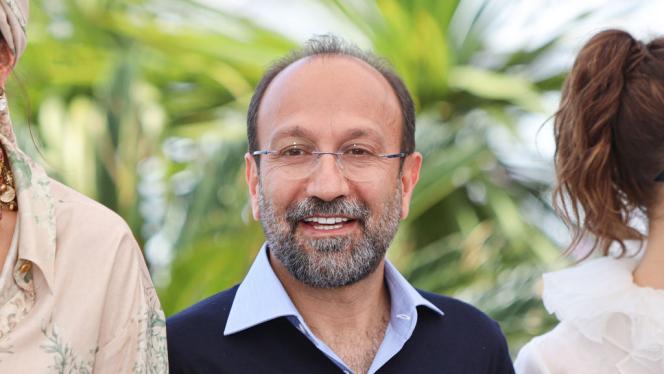Tuesday 22 October 2024
Asghar Farhadi's film “A Hero” reexamines the concept of heroism

Farhadi’s film interrogates our personal and public need for the morally pure hero, revealing our more cynical motivations for idealising and propping these figures up
In his latest film A Hero, produced by Amazon in 2021, Iranian film director Asghar Farhadi doesn’t deviate from his stylistic motifs and strategies in interrogating ordinary life, using carefully selected and condensed symbols, and displaying a passion for pure realism. These are the pillars of Farhadi’s cinematic oeuvre, alongside the emotionally charged family dialogues he enriches with his characteristic subtlety and sentiment.
The film opens with a scene of the prisoner Rahim Soltani (played by the prominent actor and tennis player Amir Jadidi) exiting the prison, and we specifically see his attempt to run and catch a public bus on one of the streets; but he misses it. This is followed by a relatively long shot where Rahim climbs a very tall scaffold to meet his friend and brother-in-law, Hussein (played by Ali Reza Jahanbakhsh), who works on a cliff filled with sculptures and historical engravings in the northeastern part of the Iranian city of Shiraz. It is an archaeological site that houses the famous tombs of the most renowned Persian kings, such as Xerxes the First. These opening scenes almost summarise Tahir's story in the film, which oscillates between his efforts to repay his debts and secure his release, and the resounding failure despite all his efforts. Shiraz, with its storied connection to some of the greatest figures in Persian history, serves as a fitting backdrop for Farhadi’s thematic exploration of what it means to be a hero.
Soltani works in a prison where he spends his days making drawings and calligraphy on his walls, which eventually earns him a two-day furlough from prison. At first glance, Soltani's gentle smile dominates the scene, and this is a smart choice by the director to evoke sympathy towards him—a peaceful and beloved person who entered prison due to his inability to pay off the debts to his ex-wife’s father, Bahram (played by Mohsen Tanabandeh), a harsh character with stern features not dissimilar to villains you’ll have seen in other films. The casting works very well but there are two characters that complete the story: Soltani's secret fiancée Farakhondeh (played by Sahar Goldust) and his son Siavash (played by Saleh Karimi), who suffers from a speech and language impairment.
The film’s events escalate when his girlfriend, Farakhondeh, stumbles upon 17 gold pieces and begins to plan to sell them and repay the debts in order to secure Soltani's release. However, in a bizarre but well-intentioned turn, he decides to search for the person who lost the gold pieces in order to return them. He starts contacting banks and distributes advertisements with the prison's phone number, prompting bank employees to question whether he is an employee at the prison. But he responds by informing them that he is on a two-day furlough.
The peculiarity of this decision places him at the centre of the national conversation on TV and social media, platforms which thrive on sensational stories like his. However, what is surprising is that Soltani will become a victim of those entities, and his ethical stance will collapse as quickly as it rose as it becomes tied to his rapidly growing fame. The film works by transforming the dynamics of the story into a tense psychological drama that reconstructs the hero’s stance.
It does so without major twists in the story, and unfolds with a silky gentleness and demonstrating the director’s storytelling skill. Soltani’s sincerity and integrity are mixed with his concealment of the full truth, especially his concealment of his relationship with his girlfriend and the fact that she was the one who found the gold pieces. His appearance on stage as an ethical hero who returned a fortune he needed diminishes the viewer's leading to questions about the motives for Soltani arise.
This forms the essence of Farhadi's film philosophy in creating tension in the viewer's mind when faced with a situation that initially seems unequivocally clear. Suddenly, the equation is reversed, and the hero is accused of misleading public opinion and exploiting charitable organisations and donors who had collected large sums of money to repay his debts, assuming him to be a stellar character worthy of support and social redemption. In a dialogue scene that encapsulates the dilemma he faces, he defends himself against an attack by his sister Melliteh (played by Maryam Shahedai) by saying, “I didn't lie,” to which she firmly responds, “but you didn't tell the truth,” fuzzing the line between omission and falsehood, between honesty and deceit. Would you try to capitalise on the situation in a similar way if it would help you in prison?
What complicates Soltani's situation further is the attempt by official institutions such as the media, prison administration, and charitable organisations to exploit his story for their own gains, often related to their reputation and image. One of the prison officials tells him that he has become the talk of all of Iran and that he should act accordingly. Attempting to capitalise on the situation, the prison director requests Soltani record a video with his son in order to elicit sympathy from the public. The prison director also requests to record a video of his son who has difficulty speaking in order to elicit sympathy from the public, who have turned against his story. However, Soltani firmly rejects all of these attempts decisively, even if it means returning to prison.
The film questions the concept of heroism and satirises it. In one of the dialogues, the director says, “Why does society need to make someone a hero? It seems they want others to be like that person, which is unrealistic because people cannot live another person’s life.” Farhadi also demonstrates in the film why you might not necessarily want to.
What is striking in the film in terms of cinematography is that the most important scenes take place in confined spaces: offices, cars, corridors, the living room in the house, Bahram's small printing shop. This adds a high level of realism. Farhadi also opted for a deeper level of realism in the film compared to his previous works by choosing unknown actors and some theatre actors with little experience in cinema, such as Amir Jafari. The film did not rely on visual effects for realism except for one scene, which is the crowd scene where the director did not want face masks to be present.
The most important aspect of Farhadi's films, including this one, is that they are not concerned with politics in the direct sense. He also breaks with tropes about Iran that foreign viewers may come to expect; nor is he preoccupied with ready-made moral biases or simple solutions to ethical conundrums. Instead, his works tend to stand at an equal distance from their protagonists whether hero or villain and the guilty and innocent change masks. The characters are not clearly coded as good nor bad; they are placed in difficult situations that reveal their fallibility: “when defeat becomes everyone’s fate,” as he says, simple ethical questions become suffused with shades of grey.
The film has been recognised for its brilliance achieving second place at the Cannes International Film Festival for Best Film in 2021. However, it was not fortunate enough to reach the final nominations for the Oscars, despite Farhadi winning twice before in the Foreign Language Film category for his films A Separation in 2012 and The Salesman in 2018.
He boycotted the latter’s award ceremony in protest against the travel ban that targeted predominantly Muslim countries, including Iran. At that time, the Iranian astronaut Anousheh Ansari accepted the award on his behalf and read a statement he had written: “My absence is a sign of respect for my country’s people and the people of the other six countries who have not been respected by the inhumane law that prohibits immigrants from entering the United States.”









